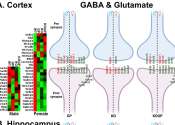Small protein plays big role in chronic HIV infection
NeuroHIV refers to the effects of HIV infection on the brain or central nervous system, and to some extent, the spinal cord and peripheral nervous system. A collection of diseases, including neuropathy and dementia, neuroHIV ...
Apr 4, 2024
0
42








